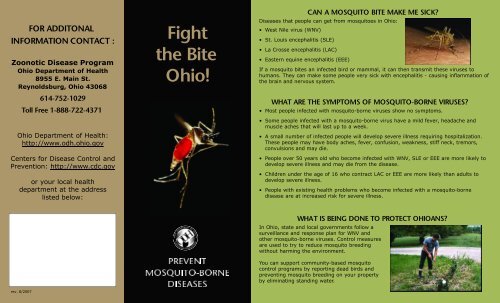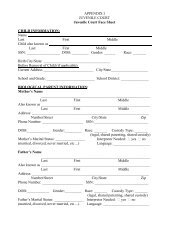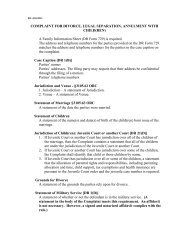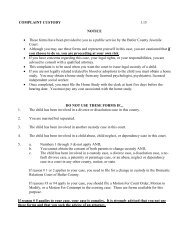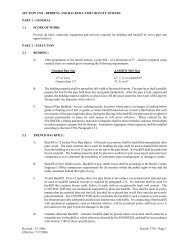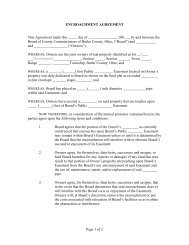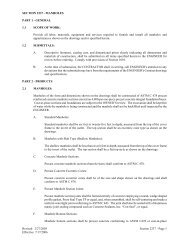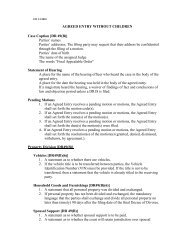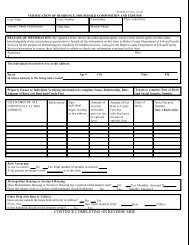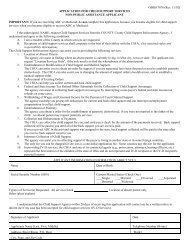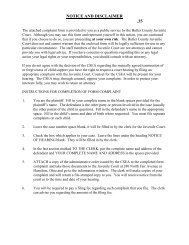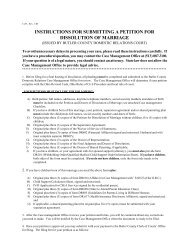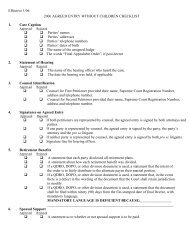Mosquito Brochure - Ohio Department of Health
Mosquito Brochure - Ohio Department of Health
Mosquito Brochure - Ohio Department of Health
Create successful ePaper yourself
Turn your PDF publications into a flip-book with our unique Google optimized e-Paper software.
FOR ADDITONAL<br />
INFORMATION CONTACT :<br />
Zoonotic Disease Program<br />
<strong>Ohio</strong> <strong>Department</strong> <strong>of</strong> <strong>Health</strong><br />
8955 E. Main St.<br />
Reynoldsburg, <strong>Ohio</strong> 43068<br />
614-752-1029<br />
Toll Free 1-888-722-4371<br />
<strong>Ohio</strong> <strong>Department</strong> <strong>of</strong> <strong>Health</strong>:<br />
http://www.odh.ohio.gov<br />
Centers for Disease Control and<br />
Prevention: http://www.cdc.gov<br />
or your local health<br />
department at the address<br />
listed below:<br />
Fight<br />
the Bite<br />
<strong>Ohio</strong>!<br />
CAN A MOSQUITO BITE MAKE ME SICK<br />
Diseases that people can get from mosquitoes in <strong>Ohio</strong>:<br />
• West Nile virus (WNV)<br />
• St. Louis encephalitis (SLE)<br />
• La Crosse encephalitis (LAC)<br />
• Eastern equine encephalitis (EEE)<br />
If a mosquito bites an infected bird or mammal, it can then transmit these viruses to<br />
humans. They can make some people very sick with encephalitis - causing inflammation <strong>of</strong><br />
the brain and nervous system.<br />
WHAT ARE THE SYMPTOMS OF MOSQUITO-BORNE VIRUSES<br />
• Most people infected with mosquito-borne viruses show no symptoms.<br />
• Some people infected with a mosquito-borne virus have a mild fever, headache and<br />
muscle aches that will last up to a week.<br />
• A small number <strong>of</strong> infected people will develop severe illness requiring hospitalization.<br />
These people may have body aches, fever, confusion, weakness, stiff neck, tremors,<br />
convulsions and may die.<br />
• People over 50 years old who become infected with WNV, SLE or EEE are more likely to<br />
develop severe illness and may die from the disease.<br />
• Children under the age <strong>of</strong> 16 who contract LAC or EEE are more likely than adults to<br />
develop severe illness.<br />
• People with existing health problems who become infected with a mosquito-borne<br />
disease are at increased risk for severe illness.<br />
W H AT IS BEING DONE TO PROTECT OHIOANS<br />
In <strong>Ohio</strong>, state and local governments follow a<br />
surveillance and response plan for WNV and<br />
other mosquito-borne viruses. Control measures<br />
are used to try to reduce mosquito breeding<br />
without harming the environment.<br />
You can support community-based mosquito<br />
control programs by reporting dead birds and<br />
preventing mosquito breeding on your property<br />
by eliminating standing water.<br />
rev. 8/2007
REPORTING DEAD BIRDS<br />
• West Nile virus <strong>of</strong>ten kills crows<br />
and blue jays. Dead crows and blue<br />
jays may be a sign that WNV is<br />
circulating between birds and<br />
mosquitoes in an area.<br />
• Contact your local health<br />
department if you see dead birds<br />
during mosquito season.<br />
• Local health departments may<br />
send dead crows and blue jays to<br />
the <strong>Ohio</strong> <strong>Department</strong> <strong>of</strong> <strong>Health</strong> for<br />
testing.<br />
• By reporting dead birds to your<br />
local health department, you can<br />
play an important role in<br />
monitoring WNV.<br />
AVOID BEING BITTEN BY MOSQUITOES<br />
• Clothing will help protect you from mosquito<br />
bites. When possible, wear long sleeves, long<br />
pants and socks in addition to repellent when<br />
outdoors.<br />
• Repel mosquitoes when going outdoors during<br />
mosquito season by using repellents that contain<br />
an EPA-registered active ingredient such as DEET<br />
or picaridin. Follow the directions on the label.<br />
• Be aware <strong>of</strong> peak mosquito hours. <strong>Mosquito</strong>es are<br />
most active and biting during the early morning and late evening hours. If outdoors at<br />
dawn or dusk, take extra care to use repellent and wear protective clothing.<br />
• Keep window and door screens closed and in good repair to keep mosquitoes out <strong>of</strong><br />
your house.<br />
• <strong>Mosquito</strong>es rest in tall weeds. Keep weeds cut short to help deter mosquitoes.<br />
DRAIN W ATER WHERE<br />
MOSQUITOES GROW<br />
• <strong>Mosquito</strong>es can grow in containers<br />
that hold water for more than a<br />
week such as pop cans, buckets,<br />
bottles and discarded tires.<br />
• Containers that fill with water should<br />
be emptied at least once a week.<br />
• Change the water in birdbaths every<br />
week.<br />
• Keep rain gutters clean.<br />
• Fix outdoor leaking faucets.<br />
• Clean ditches so water can flow.<br />
• Fill holes that hold water with gravel<br />
or dirt.<br />
• Avoiding mosquitoes doesn’t mean kids have to stay inside in front <strong>of</strong> the TV. Get<br />
them outside and playing, but remember – a couple <strong>of</strong> seconds applying an effective<br />
repellent to exposed skin and clothing will help everyone stay healthy.<br />
• On children, use products that have no more than 10 percent DEET. Follow the<br />
directions on the label.


